- Home
- Robert K. Massie
Nicholas and Alexandra Page 14
Nicholas and Alexandra Read online
Page 14
Tsushima abruptly ended Russia’s “Holy Mission” in Asia. Beaten and humiliated by the Japanese “monkeys,” the Russian giant staggered back toward Europe. In Berlin, as he watched events unfold, the Kaiser was not displeased. With a sullen, defeated army, no navy and a disillusioned, embittered people, the Tsar was no longer a neighbor to fear. William assumed that he still possessed Nicholas’s friendship. He soothed the Tsar, reminding him that even Frederick the Great and Napoleon had suffered defeats. He strutted in the loyalty he had shown to Russia by “guarding” Russia’s frontier in Europe—presumably from his own ally, Austria. Now, stepping smoothly over the ruins of the Far Eastern adventure he had done so much to promote, the Kaiser reverted to his original purpose: breaking the Russian alliance with France by seducing Nicholas into a new alliance of autocrats between Russia and Germany.
This last spectacular attempt by the Kaiser to manipulate the Tsar was the episode at Björkö on the coast of Finland in July 1905. It had its immediate origins in the international furor arising from the incident at Dogger Bank. The British press, loudly advocating that the Royal Navy prevent German steamers from coaling the Russian warships, had driven the Kaiser to frenzy. Nicholas replied to a letter from William by saying, “I agree fully with your complaints about England’s behavior … it is certainly high time to put a stop to this. The only way, as you say, would be that Germany, Russia and France should at once unite to abolish Anglo-Japanese arrogance and insolence. Would you like to lay down and frame the outlines of such a treaty? As soon as it is accepted by us, France is bound to join as an ally.”
William was overjoyed and feverishly began to draw up the treaty. The following summer, the Kaiser privately telegraphed the Tsar, inviting him to come as a “simple tourist” to a rendezvous at sea. Nicholas agreed and left Peterhof one afternoon without taking any of his ministers. The two Imperial yachts, Hohenzollern and Standart, anchored that night in the remote Finnish fjord and the two Emperors had dinner together. The next morning William reached into his pocket and “by chance” found the draft of a treaty of alliance between Russia and Germany. Among its provisions was an agreement that France was to be told only after Russia and Germany had signed and then invited to join if she wished. Nicholas read it and, according to William, said, “That is quite excellent. I agree.”
“Should you like to sign it,” said the Kaiser casually, “it would be a very nice souvenir of our interview.”
Nicholas signed and William was jubilant. With tears of joy, he told Nicholas that he was sure that all of their mutual ancestors were looking down on them from heaven in ecstatic approval.
Upon returning to their respective capitals, both Emperors received unpleasant shocks. Von Bülow, the German Chancellor, criticized the treaty as useless to Germany and threatened to resign. The deflated Kaiser wrote his Chancellor a hysterical letter: “The morning after the arrival of your letter of resignation would no longer find your Emperor alive. Think of my poor wife and children.” In St. Petersburg, Lamsdorf, the Russian Foreign Minister, was aghast; he could not believe his eyes and ears. The French alliance, he pointed out to Nicholas, was the cornerstone of Russian foreign policy; it could not be lightly thrown aside. France, said Lamsdorf, would never join an alliance with Germany, and Russia could not join such an alliance without first consulting France.
Eventually William was informed that, as written, the treaty could not be honored. The Kaiser responded with an impassioned plea to the Tsar to reconsider: “Your Ally notoriously left you in the lurch during the whole war, whereas Germany helped you in every way.… We joined hands and signed before God who heard our vows. What is signed is signed! God is our testator!” But the Björkö treaty was never invoked, and the private Willy-Nicky correspondence soon dwindled away. Thereafter, the Kaiser’s influence over the Tsar also faded rapidly. But Nicholas’s eyes were opened late. By 1905, he had lost a war and his country was rushing full tilt into revolution.
CHAPTER NINE
1905
THE “small victorious war” so ardently desired by Plehve, the Minister of Interior, was over, but Plehve did not live to see it. Vyacheslav Plehve was a professional policeman: his most spectacular piece of work had been the rounding up of everyone involved in the plot which killed Alexander II. Appointed Minister of Interior in 1902 after his predecessor had been killed by a terrorist, Plehve was described by a colleague as “a splendid man for little things, a stupid man for affairs of state.” As Minister, he permitted no political assemblies of any kind. Students were not allowed to walk together on the streets of Moscow or St. Petersburg. It was impossible to give a party for more than a few people without first getting written permission from the police.
Russia’s five million Jews were a special object of Plehve’s hatred.* In a bitter cycle of repression and retaliation, Russian Jews were driven in numbers into the ranks of revolutionary terrorism. Under Plehve, local police were encouraged to turn a blind eye toward anti-Semites. On Easter Day, Plehve’s policy led to the most celebrated pogrom of Nicholas’s reign: a mob running wild in the town of Kishenev in Bessarabia murdered forty-five Jews and destroyed six hundred houses; the police did not trouble to intervene until the end of the second day. The pogrom was condemned by the government, the governor of the province was dismissed and the rioters tried and punished, but Plehve remained in power. Witte bluntly told the Interior Minister that his policies were making his own assassination inevitable. In July 1904, Plehve was blown to pieces by an assassin’s bomb.
Plehve’s death did not destroy his most inventive project, a workers’ movement created and secretly guided by the police. The movement was led by a youthful St. Petersburg priest, Father George Gapon, who hoped by his efforts to immunize the workers against revolutionary viruses and strengthen their monarchist feelings. Economic grievances were to be channeled away from the government in the general direction of the employers. The employers, understandably touchy, were persuaded in turn that it was better to have an organization watched and controlled by the police than to leave the workers to the dangerous blandishments of clandestine socialist propagandists.
Gapon was not an ordinary hack police agent. His interest in the people was genuine, and in the working-class districts of St. Petersburg where he had worked and preached for several years, he was a popular figure. He sincerely believed that the purpose of his Assembly of Russian Workingmen was to strive “in a noble manner under the leadership of educated, genuinely Russian people and clergymen toward a philosophy of life and the status of the working man in a sound Christian spirit.” By some, Gapon’s police connections were suspected, but the mass of workers, happy enough to have any machinery which enabled them to meet and protest, looked to him for leadership.
Early in January 1905, the humiliating news of Port Arthur’s surrender sent a wave of protest against mismanagement of the war sweeping across the country. In St. Petersburg, a minor strike at the huge Putilov steel works suddenly spread until thousands of disillusioned, restless workers were out on strike.* Swept along by this surge of feeling, Gapon had a choice: he could lead or be left behind. Rejecting his role as agent of the police, he chose to lead. For a week he went from meeting hall to meeting hall, giving dozens of speeches, whipping up impassioned support and, day by day, enlarging his list of demands. Before the end of the week, carried away by his sense of mission, he was rallying the workers with an extravagant theatrical vision: He personally would lead a mass march to the Winter Palace, where he would hand to Nicholas a petition on behalf of the Russian people. Gapon visualized the scene taking place on a balcony above the vast sea of Russian faces, where the Batiushka-Tsar, acting out the Russian fairy tale, would deliver his people from their evil oppressors, named in the petition as the “despotic and irresponsible government” and the “capitalistic exploiters, crooks and robbers of the Russian people.” Along with deliverance, the petition also demanded, specifically, a constituent assembly, universal suffrage, universal
education, separation of church and state, amnesty for all political prisoners, an income tax, a minimum wage and an eight-hour day.
Gapon did not communicate the extent of his intentions to any responsible government official; had he done so, they probably would not have listened. Prince Sviatopolk-Mirsky, the newly appointed liberal Minister of Interior, was concerned for most of the week about the Tsar’s ceremonial visit to St. Petersburg on Thursday, January 19, for the traditional religious service of the Blessing of the Waters. In balance, that day was a success: Nicholas was received with cheers as he drove past dense crowds in the streets. While he stood on the Neva bank, a cannon employed in the ceremonial salute fired a live charge which landed near the Tsar and wounded a policeman, but investigation proved that the shot was an accident, not part of a plot.
Only on Saturday, January 21, when Gapon informed the government that the march would take place the following day and asked that the Tsar be present to receive his petition, did Mirsky suddenly become alarmed. The ministers met hurriedly to consider the problem. There was never any thought that the Tsar, who was at Tsarskoe Selo and had been told of neither the march nor the petition, would actually be asked to meet Gapon. The suggestion that some other member of the Imperial family receive the petition was rejected. Finally, informed by the Prefect of Police that he lacked the men to pluck Gapon from among his followers and place him under arrest, Mirsky and his colleagues could think of nothing to do except bring additional troops into the city and hope that matters would not get out of hand.
On Saturday night, Nicholas learned for the first time from Mirsky what the morrow might bring. “Troops have been brought from the outskirts to reinforce the garrison,” he wrote in his diary. “Up to now the workers have been calm. Their number is estimated at 120,000. At the head of their union is a kind of socialist priest named Gapon. Mirsky came this evening to present his report on the measures taken.”
Sunday morning, January 22, 1905, with an icy wind driving flurries of snow, Father Gapon began his march. In the workers’ quarters, processions formed to converge on the center of the city. Locking arms, they streamed peacefully through the streets in rivers of cheerful, expectant humanity. Some carried crosses, icons and religious banners, others carried national flags and portraits of the Tsar. As they walked, they sang religious hymns and the Imperial anthem, “God Save the Tsar.” At two p.m. all of the converging processions were scheduled to arrive at the Winter Palace.
There was no single confrontation with the troops. Throughout the city, at bridges and on strategic boulevards, the marchers found their way blocked by lines of infantry, backed by Cossacks and Hussars. Uncertain what this meant, still not expecting violence, anxious not to be late to see the Tsar, the processions moved forward. In a moment of horror, the soldiers opened fire. Bullets smacked into the bodies of men, women and children. Crimson blotches stained the hard-packed snow. The official number of victims was ninety-two dead and several hundred wounded; the actual number was probably several times higher. Gapon vanished and the other leaders of the march were seized. Expelled from the capital, they circulated through the empire, exaggerating the casualties into thousands.
The day, which became known as “Bloody Sunday,” was a turning point in Russian history. It shattered the ancient, legendary belief that tsar and the people were one. As bullets riddled their icons, their banners and their portraits of Nicholas, the people shrieked, “The Tsar will not help us!” It would not be long before they added the grim corollary, “And so we have no Tsar.” Abroad, the clumsy action seemed premeditated cruelty, and Ramsay MacDonald, a future Labor Prime Minister of Britain, attacked the Tsar as a “blood-stained creature” and a “common murderer.”
Father Gapon, from his place of hiding, issued a public letter, bitterly denouncing “Nicholas Romanov, formerly Tsar and at present soul-murderer of the Russian empire. The innocent blood of workers, their wives and children lies forever between you and the Russian people.… May all the blood which must be spilled fall upon you, you Hangman!” Gapon became a full-fledged revolutionary: “I call upon all the socialist parties of Russia to come to an immediate agreement among themselves and begin an armed uprising against Tsarism.” But Gapon’s reputation was cloudy, and the leaders of the Social Revolutionary Party were convinced that he still had ties with the police. They sentenced him to death and his body was found hanging in an abandoned cottage in Finland in April 1906.
At Tsarskoe Selo, Nicholas was stunned when he heard what had happened. “A painful day,” he wrote that night. “Serious disorders took place in Petersburg when the workers tried to come to the Winter Palace. The troops have been forced to fire in several parts of the city and there are many killed and wounded. Lord, how painful and sad this is!” The ministers met in great alarm and Witte immediately suggested that the Tsar publicly dissociate himself from the massacre by declaring that the troops had fired without orders. Nicholas refused to cast this unfair aspersion upon the army and instead decided to receive a delegation of thirty-four hand-picked workers at Tsarskoe Selo. The workers arrived at the palace and were given tea while Nicholas lectured them, as father to sons, on the need to support the army in the field and to reject the wicked advice of treacherous revolutionaries. The workers returned to St. Petersburg, where they were ignored, laughed at or beaten up.
The Empress was in a state of despair. Five days after “Bloody Sunday,” she wrote to her sister Princess Victoria of Battenberg:
“You understand the crisis we are going through! It is a time full of trials indeed. My poor Nicky’s cross is a heavy one to bear, all the more as he has nobody on whom he can thoroughly rely and who can be a real help to him. He has had so many bitter disappointments, but through it all he remains brave and full of faith in God’s mercy. He tries so hard, works with such perseverance, but the lack of what I call ‘real’ men is great.… The bad are always close at hand, the others through false humility keep in the background. We shall try to see more people, but it is difficult. On my knees I pray to God to give me wisdom to help him in his heavy task.…
“Don’t believe all the horrors the foreign papers say. They make one’s hair stand on end—foul exaggeration. Yes, the troops, alas, were obliged to fire. Repeatedly the crowd was told to retreat and that Nicky was not in town (as we are living here this winter) and that one would be forced to shoot, but they would not heed and so blood was shed. On the whole, 92 killed and between 200–300 wounded. It is a ghastly thing, but had one not done it the crowd would have grown colossal and 1,000 would have been crushed. All over the country, of course, it is spreading. The Petition had only two questions concerning the workmen and all the rest was atrocious: separation of the Church from the Government, etc. etc. Had a small deputation brought, calmly, a real petition for the workmen’s good, all would have been otherwise. Many of the workmen were in despair, when they heard later what the petition contained and begged to work again under the protection of the troops.
“Petersburg is a rotten town, not one atom Russian. The Russian people are deeply and truly devoted to their Sovereign and the revolutionaries use his name for provoking them against landlords, etc but I don’t know how. How I wish I were clever and could be of real use. I love my new country. It’s so young, powerful and has so much good in it, only utterly unbalanced and childlike. Poor Nicky, he has a bitter, hard life to lead. Had his father seen more men, drawn them around him, we should have had lots to fill the necessary posts; now only old men or quite young ones, nobody to turn to. The uncles no good, Mischa [Grand Duke Michael, the Tsar’s younger brother] a darling child still.…”
But “Bloody Sunday” was only the beginning of a year of terror. Three weeks later, in February, Grand Duke Serge, the Tsar’s uncle and Ella’s husband, was assassinated in Moscow. The Grand Duke, who took a harsh pride in knowing how bitterly he was hated by revolutionaries, had just said goodbye to his wife in their Kremlin apartment and was driving through one of the gates
when a bomb exploded on top of him. Hearing the shuddering blast, Ella cried, “It’s Serge,” and rushed to him. What she found was not her husband, but a hundred unrecognizable pieces of flesh, bleeding into the snow. Courageously the Grand Duchess went to her husband’s dying coachman and eased his last moments by telling him that the Grand Duke had survived the explosion. Later she visited the assassin, a Social Revolutionary named Kaliayev, in prison and offered to plead for his life if he would beg the Tsar for pardon. Kaliayev refused, saying that his death would aid his cause, the overthrow of the autocracy.
The murder of her husband changed Ella’s life. The gay, irrepressible girl who had guided her small, motherless sister Alix; who had fended off the attentions of William II; who had skated and danced with the Tsarevich Nicholas—this woman disappeared. All of the gentle, saintly qualities suggested by her quiet acceptance of her husband’s character now came strongly forward. A few years later, the Grand Duchess built an abbey, the Convent of Mary and Martha, in Moscow and herself became the abbess. In a last gesture of worldly flair, she had the robes of her order designed by the fashionable religious painter Michael Nesterov. He designed a long, hooded robe of fine, pearl-gray wool and a white veil, which she wore for the rest of her life.
As the months rolled by, violence spread to every corner of Russia. “It makes me sick to read the news,” said Nicholas, “strikes in schools and factories, murdered policemen, Cossacks, riots. But the ministers instead of acting with quick decision, only assemble in council like a lot of frightened hens and cackle about providing united ministerial action.” The slaughter of Rozhdestvensky’s fleet in Tsushima raised a storm of mutiny in the ships remaining in the Baltic and Black Sea fleets. Sailors of the battleship Potemkin, angered when they were served portions of bad meat, threw their officers overboard, raised the red flag and steamed their ship along the Black Sea coast, bombarding towns, until the need for fuel forced them to intern at the Rumanian port of Constanza.

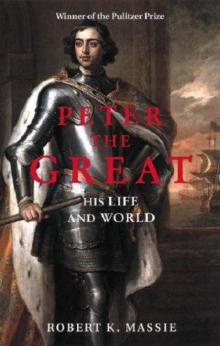 Peter the Great
Peter the Great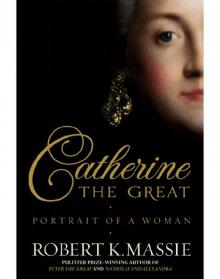 Catherine the Great
Catherine the Great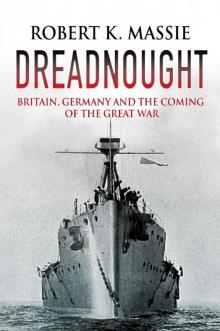 Dreadnought
Dreadnought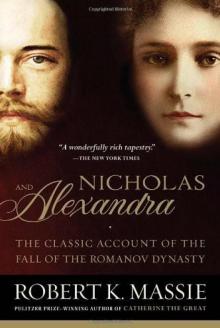 Nicholas and Alexandra: The Classic Account of the Fall of the Romanov Dynasty
Nicholas and Alexandra: The Classic Account of the Fall of the Romanov Dynasty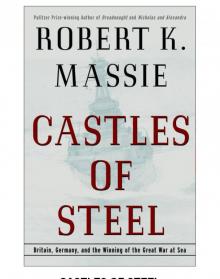 Castles of Steel
Castles of Steel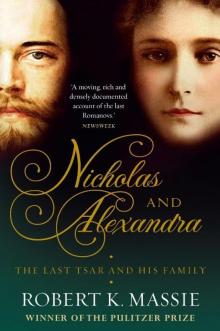 Nicholas and Alexandra: The Tragic, Compelling Story of the Last Tsar and his Family
Nicholas and Alexandra: The Tragic, Compelling Story of the Last Tsar and his Family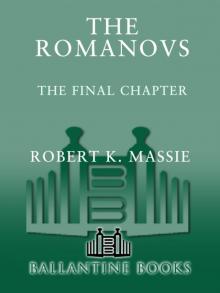 The Romanovs
The Romanovs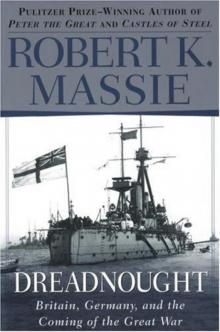 Dreadnought, Britain, Germany and the Coming of the Great War
Dreadnought, Britain, Germany and the Coming of the Great War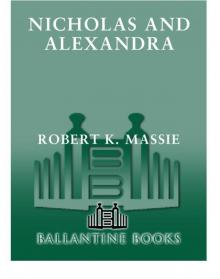 Nicholas and Alexandra
Nicholas and Alexandra